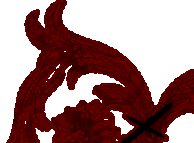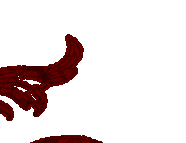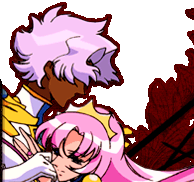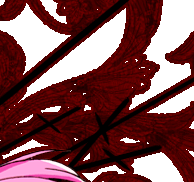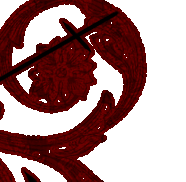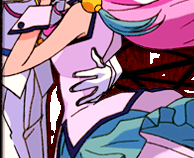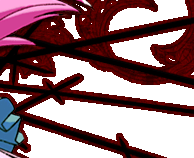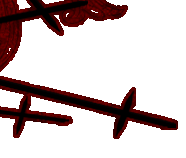
This analysis
was donated by Spiral Artist.
“But, by all means, stay in this cozy coffin of yours and continue to play prince.”
Anthy’s final words to her brother, the former prince Dios may seem like a “take that!” It
may seem like a jab, a well-aimed shot taken at the rewinding of the duel cycle. It’s one of
Revolutionary Girl Utena’s “blink and you’ll miss it” moments where an otherwise throwaway line gains tremendous
importance.
Let us begin with what Anthy does after making this statement. She turns around and
leaves while Akio, the master manipulator, impotently calls on after her. Curious, though, is that
we know he can stop her if he wanted to. He certainly does not lack the power to do so, given
that he is the supreme being in Ohtori Academy, and, for all intents and purposes, the Prince.
But he just lets her go, even after stating that he’ll need her help in going through yet another
cycle. This is when the second aspect of Anthy’s statement comes into play, and stumbles unto
the third. Anthy delivers the line after Akio says that he’s “reinstating the rules of the Rose
Crest” and that, as he suspected, “she (Utena) caused no revolution to occur.” Given that Anthy
is fixing to leave Ohtori, that there was no revolution seems blindness on Akio’s part. Again,
things are not that simple. This is where the third aspect emerges. But in order to understand
that, we will need to delve deeper (“go deeper”) into what will be termed Akio’s Ploy, so before
that, a fourth aspect must be mentioned, if only as a teaser – Akio’s (again) seemingly
throwaway line when Utena’s Sword of Heart breaks: “Your sword did not work either.”
Now that we’ve teased, it is time to please. Let us dig a little deeper.
 The Sisyphus Scenario
There are a few layers to Akio’s ploy, mainly involving the minute manipulation and
corruption of duelists, but in its heart, Akio’s entire ploy hinges on a sort of “champion” to
emerge. This “champion,” perhaps manipulated by Akio prior to making an appearance, will
then be drawn into the duel cycle, and if they prove stalwart and true, and with conspicuous aid
from Dios himself, they will clear their way to the Revolution duel. At that point, Akio will
retrieve the champion’s Sword of Heart and use it to open the Rose Gate, to regain the power of
miracles. Removing their swords will also remove the champion as a threat or interference, as
by doing so, Akio will also take away their will to fight.
It is at this point that he appears to be geared towards opening the Rose Gate. The
champion must carry a pure and noble heart, so that their swords might be powerful enough to
serve Akio’s needs. There is the slight snag that the extracted swords often are only as powerful
or as noble as their wielders, as Utena was able to defeat Saionji, Dios or no, with a damn
wooden practice sword, but let’s not digress into that. For all intents and purposes, the
champion must be groomed to be a champion, so that Akio can take away their most powerful
sword and subjugate them to his will upon the Revolution point.
However, it is also at this point that Akio’s ploy reveals itself to be the exact opposite of
what it seems from the onset. These are discernible steps in what is (almost) outright stated to be
a repeating cycle. The image of the ouroboros, the serpent that eats its own tail, would be better
suited for Akio’s ploy – it does not have a resolution, or a breaking point. It begins, move
towards its end point, which is also, coincidentally, its beginning. There are variations, however
minor, but the cycle itself is preserved. The players forget the champion after her demise, and
when the next one comes, they assume their roles. Maybe a male champion arrives, or maybe a
champion with one arm, but the end result is still the same – the Revolution duel and Akio’s
failure to open the Rose Gate.
To further dwell on the ploy requires a brief look at Akio Ohtori himself. To begin with,
he is not just a manipulator but a corruptor as well. He uses the weaknesses of others against
them, so that they may use it against others in turn. He twists the perception of those he targets
to fit his own purposes. If we are able to take Utena as a case-in-point, he personally casts
shadows of doubt on her presupposed dedication to the Prince from her childhood, drives a
wedge between her and Anthy by at times purposefully isolating her, seduces her, deflowers her,
brings her to the point where she might even consider accepting the mantle of the Princess… in
fact, his status as a playboy is a foregone conclusion, but to one like Utena, having slept with
someone whose sister she means to protect (whom she at one point knows is sleeping with her
brother), an engaged man at that, would be considered the moral compass going all out of whack.
The duelists he constantly throws her way during his Car Arc just to test her to the limits,
embellished with fake Rose Brides dangerous car-fu (even though it is just play dueling) and the
build-up to the Revolution duel all seek to wear her down. The talk of sandwiches and asparagus
aside, the point of that entire episode is to have Utena in his car, as he did any other duelist he
managed to twist into dueling her.
So why would Akio want to corrupt a champion whose main quality must be nobility,
with a secondary companion of that being purity? That is further explained in two factors, both
that come to the fore when he stands before the Rose Gate.
The first factor is that, Utena’s sword does not work “either,” meaning that his previous
champions’ swords have likewise failed. Yet, we are shown that Utena herself can open the
Rose Gate without the use of a sword, by the very same mechanism that allows duelists into the
Arena they use for the most of the series. A Rose Crest and the will to open it are the two things
that are required. How is it that Akio does not know this? The answer is so simple it seems to be
stupid: he does. It is absurd to think that in all his years, he has never thought to just grab the
handles and give the Gate a pull. A possible explanation is why he needs a pure champion in the
first place: the Gate does not open for him as he hasn’t “got it.” He is corrupt, he is villainous
and impure, and as such, the Gate doesn’t let him through. That is why he uses an extension of a
(supposedly noble) champion to force his way in. However, he fails, quite spectacularly every
single time, it would seem.
Why is this ploy doomed to failure? This is where the second factor comes in: what can
he gain from manipulating and, where need be, corrupting the champion whose uncorrupted
characteristics are supposed to ensure his ploy’s success? “Never lose your noble heart, even
when you grow up.” That is his heroine-making line, after all. This implies that growing up is
what corrupts noble hearts – but even in that, there is another side. The scene wherein Akio
demonstrates eternity to a young and distraught Utena shows him growing up, in a sense – from
the childlike Dios to the full adult Akio. We know that Akio himself is ageless, which will be
mentioned again below. His agelessness isn’t so much omnipotent immortality as it is a
demonstration of the irreversibility of corruption in noble hearts. After a certain point, he has
already grown up, and cannot go back and thus cannot find the power of miracles that he used to
hold. For him to ask that of his chosen champion is not just mirroring his own position, a-la
“don’t make my mistakes” but rather a word of caution.
However, for such an encouragement, he seems to make sure that the champion is built
up to break down. Utena’s case is no different. Akio manipulates her in various ways; first, he
makes her an aspirant by showing her something eternal: Anthy’s agony. Then, he begins testing
her, one of the toughest being Touga’s defeat of her. When that shiny car finally comes around,
Akio begins to gradually erode her. He seduces her and when she gets to the Revolution duel,
she is almost ready to surrender. In essence, her acknowledgement that she was using Anthy to
play the hero in the aftermath of the latter’s suicide attempt, is a double-edged confession. In
that instance, it’s both that she has been corrupted enough to think herself noble while using
another to play prince, and her disregard for Anthy in general as she was only a means to an end.
It sounds more like a lament to a truth rather than a hastily-drawn conclusion, which
demonstrates Akio’s influence sublimely.
On the eve of the Revolution duel, Akio makes a comment that gives a further hint as to
the ploy itself. “You only know play dueling.” The implication is that the Revolution duel isn’t
one where you mess around with roses pinned to chest pockets. It’s not a game, it’s not a farce,
it’s real. Or, is it? The Revolution duel takes place across all the previous iterations of the
dueling arena, finally revealing itself to be the planetarium projector. The setting is a sham. The
duel does not seem to have a purpose, or an objective, unlike the previous one. The process is a
sham. It doesn’t end with any one party’s victory over the other, but when Anthy betrays Utena.
The win condition is a sham. In summation, the Revolution duel is more of a play duel than any
of the previous ones (e.g. Saionji’s first rematch.) This obvious illusion is contradicted only by
one thing: Akio’s words. He seems to state that the Revolution duel is serious business, but then
proceeds to prove that it is business as usual, instead.
It is not so much an obvious duality of power vs. powerlessness, as Akio is not
powerless. It is more of a real intent vs. feigned intent in the case of his plot, where the real
intent may only register at an unconscious level, but is, quite clearly, present.
Akio’s ploy has one goal, and one goal only: to fail. If that is too absolute, perhaps
another way of putting it would be that his ploy has one goal, and that is to not reach the claimed
goal, thwarting any attempt to actually do so by various set moves (e.g. seduction of the
champion.) Akio claims to want the power of miracles back, but a few choice words by Anthy
can demonstrate aptly why that is just an empty proclamation.
 Encoffination
“But, by all means, stay in this cozy coffin of yours and continue to play prince.”
The “coffin” image appears four times over the course of the series. First as Utena’s.
Secondly as those of the Black Rose boys. Then as Anthy’s. In each of these appearances, the
coffin symbolizes not death or after-the-end, but rather rebirth or before-the-beginning. Utena is
a lost, broken little girl in her coffin, and she emerges an aspiring champion. The Black Rose
boys are ghosts left of Mikage’s sins, victims as it were, and their rings, once they emerge,
become corruptors. Anthy is just the witch, the Rose Bride when in her coffin, and she emerges
as Himemiya Anthy, fully realized. In each of these cases, there is progress, a movement from
point A to B, which is in direct opposition to the Rose Crest rules’ cyclical nature.
This becomes more apparent when the fourth coffin is revealed. As Anthy states, that coffin is Ohtori Academy. In the other three instances, the encoffinated is distraught and in need
of help. Utena needs to be shown that not everything ends, Anthy needs to be rescued by a true
Prince, the Black Rose boys need their revenge. Once offered these things, they take it, if
hesitantly, and thus make way for something other than the constantly turning wheel of their
unchanging situation. Akio exhibits a few characteristics that points at the true nature of his
ploy.
First and foremost, it is fitting for Anthy to make a comment about “that cozy coffin of
his” as she was the one who pronounced Dios dead to an angry / needy mob. What happened to
her was the final nail, one might say, at which point Dios actually does die. Dios is not a
character so much as he is a character archetype, a Prince. When he loses that quality of himself
due to not being able to save Anthy, he finds himself in a position contrary to his raison d’etre,
and thus, perishes. Akio is Dios’ corpse.
Secondly and in line with this is the fact that life is mobile, while death is static. Living
organisms change, follow a set path from birth to death. This gap in which life exists lends itself
to the unfortunate implication that death means that the organism stops changing. It remains a
corpse, no matter which way it is put, and no change but the gradual wasting away (which, in
and of itself, is degeneration, not momentum in any real sense) can be expected. In that regard,
Akio is ageless, perhaps even immortal, because he is, again, a corpse.
Thirdly, the Black Rose boys demonstrate clearly what would actually happen if the one
in the coffin actually was dead – from victims to corruptors. How fitting that those still alive in
their coffins (Utena and Anthy) can be persuaded to walk out. Akio, being “dead” in this sense,
is “cozy” in “his coffin” precisely because he does not have the impetus for progress the others
do. The double-edged argument returns here, when Akio turns out to be both victim and
perpetrator of the cycle featured and featuring his ploy. To elaborate, the power of miracles is
lost to him, as Dios is dead. “I was like you, once. I thought persistence had merit. That it was
the best way to change the world. But just that alone cannot change anything. Without
power…” says Akio, revealing that in order to reach his professed goal, he would need to believe
again that persistence has merit, that it is the best way to change the world. But a moment of
powerlessness cost him Anthy, the power of miracles and his raison d’etre and this statement is
nothing but his affirmation that there is no going back for him. But if he cannot go back to that,
he cannot have the power of miracles. Thus, his ploy is an extension of this particular cycle of
try-as-I-might- I-can’t-even-try-but- I-will-and-try-as-I-might. The underlying cycle of the
champion and the duels is the lower level wherein Akio’s facsimile, an aspirant as opposed to an
actual Prince, takes the stage and operates, as Utena demonstrated, on the basis that “persistence
has merit” and that “it is the best way to change the world.”
Aptly, the champion is a surrogate for Akio’s shortcomings, geared towards opening the
Rose Gate. But, since “without power, you are bound to live life dependent on one another”,
Akio cannot let the champion, who has the impetus still to surpass him, succeed. The power of
miracles, he wants back, but his approach makes that act seeking power for power’s sake. He
won’t allow anyone else to have that power, but his ploy, reflective of his encoffination, actively
prevents him from retaking it as well. In a spectacular case of denying others something he
covets because he covets it, Akio’s underlying cycle with his champion reveals itself to be
designed to prevent him from reaching his goal.
Apropos, Utena manages to open the Rose Gate. The reason is extremely simple, in fact,
as simple as the mechanism required: she things persistence has merit. She thinks that it is the
best way to change the world. In short, Utena is able to open the Rose Gate precisely because
she is acting exactly like Dios. Since she is a unique case, we will assume here that the other
champions surrendered their swords and conceded themselves, leading for Anthy to don the
mantle of the 1000 Swords of Hate, and Akio to fail spectacularly in opening the Rose Gate, only
for the cycle to reset again, and the champion to be forgotten. The erasure of the champion from
memory echoes what happened to Dios, to a degree, as Anthy, Akio and the champion are the
only ones who know of him, and the champion is hazy on the details.
It is an interesting coincidence that Anthy’s impalement coincides with Akio’s attempt to
breach through the Rose Gate. It echoes the moment of Dios’ death, and given what supposedly
lies behind the Rose Gate, seems to be Akio’s attempt at resurrecting Dios, or what he perceives
to be Dios’ power (as opposed to his nature, which it very much was.) This would seem
contradictory with the abovementioned statement that Akio knows that he cannot go back to
Dios, but it is not. Notice that when Utena’s sword breaks, Akio does not throw a fit, or scream
his rage, or even seems all that interested that it did. He chucks the sword, walks back, has a
cocktail, all the while looking very bored with the whole thing. For someone who invested years
and spun yarns and webs and lines and hooks, from when Utena was just a little girl to when she
clears the Revolution duel, he seems oddly uninterested with the outcome. So much so that he
gives the impression of not really caring that much whether he made it or not, whether all the
time, energy and resources that went into recreating the same conditions that made him who he is
was worth it. Apparently, it wasn’t.
To him, his part is over. All that’s left is to watch Anthy’s sword-counter rise to 1000
and for the champion to die, and he can “play prince” again. It is here that another factor comes
to the fore – the “play.” The farcical castle, Dios’ carousel, the sham stages and mock castles and
trick-of-the-light arenas, lavish costumes and theatrical backdrops… Akio’s coffin looks just like
a faerie tale drama stage. No wonder Anthy’s impalement when he was Dios and her
impalement when he is Akio mirror one another: Akio is playing. It’s all just one big theatre,
returning to the real intent vs. feigned intent duality. On stage, he claims to want the power of
miracles back, but when its time to take a bow, he demonstrates that he doesn’t really care about
it all that much. His duality, mentioned throughout here, is a reflection of this. Akio Ohtori is
the stage actor. The mock Fallen Prince is his part. The cyclical nature of his ploy relates to this
sublimely, as his coffin is a stage, and on it he performs the same show, time after time, with
only one member of the cast constantly changing (perhaps two, if we include Ruka in that, but
his role can be filled by anyone, while the champion’s can’t.)
Why does he content himself by simply “playing prince” rather than actually being one?
There are two main reasons for this. Firstly, he was a prince; in fact, he was the Prince. While
that is lost to him entirely, it is not lost on him that he can’t escape his foundation. Dios is
Akio’s main reference point, and whatever he is, whoever he is, is all judged in reference to the
Prince That Was. The Prince, thus, is played by himself, because that is who he is. The second
reason is actually an extension of the first, as while the Prince is who he is, he can never be the
Prince again. The Prince, to repeat, is dead. Therefore, if the Prince is dead, the Prince’s Corpse
can only “play” the Prince, as an actor would play a real-life figure.
Unfortunately, all of this points towards one thing: that Akio does not have a choice.
That is valid. Dios did not have a choice himself, as he was born with as a raison d’etre, to
rescue princesses, and therefore did not have the choice of escaping his nature. Likewise, when
he perished, he left this aspect of him intact. Just like how Dios did not have a choice in being
the Prince, Akio does not have a choice in not being the Prince. In that regard, his ploy is
designed both to accommodate that fact and as a reflection of it. He is locked in his cozy coffin,
playing Prince, because while Utena became Anthy’s Prince herself, and while Princes and
Princesses roamed Ohtori Academy, he cannot not be the Prince. He has to be Akio Ohtori, and
his very nature dictates that he remains in his coffin, repeating the cycle and playing Prince,
because the only (alleged) choice-point in his life killed him, and his corpse does not see the
value in having a choice. His primary manipulation method being to influence people’s choices,
as exemplified by his infamous “car seductions,” it is only a reflection of his own situation. He
can move the pieces on the board, and he has optimized that process, but he himself is the board
itself, and he has to be stable and unchanging for the pieces to move as needed.
 Revolution
The final point comes in the form of his own statement: “As I suspected, she (Utena)
caused no revolution to occur.” At first glance, this seems true and not at the same time. The
obvious conclusion based on his ploy and the “as I suspected” part is that Akio knew she would
not be causing a revolution to occur. The other obvious conclusion, based only on the series, is
that he is blind to the revolution that actually occurred. In either case, his statement here is also
telling of one crucial point: “I will be counting on you, Anthy.” Akio’s cycle unfortunately is
connected deeply enough with Anthy that her presence is required. With this regard, it could be
said that the cycle’s smooth functioning required a concentric encoffination – that of Anthy in
the coffin of the Rose Bride, which resides inside Akio’s coffin of Ohtori Academy. Anthy
stepping out of the cycle is, considering the hinted length of its constant reiterations, is nothing
short of a revolution. Anthy leaving stirs something in Akio, and yet, while he could stop her by
force if he so wished, he instead lets her go. This is rather interesting, as there is a great deal
riding on Anthy’s presence, but his inability to stop her is not powerlessness or impotence, rather
that Anthy, once out of her coffin, is able to do what he cannot – break the cycle and start to
move forward. In a way, he could, reasonably, have forced her, but whether or not he would
succeed is another matter entirely.
The question that remains, then, is if Akio’s ploy was so dependent on Anthy being an
integral part of it that it would collapse in her absence. Unfortunately, there is no definitive
answer. Utena’s revolution is something entirely new, an point that the previous iterations had
not reached, and as such, Akio’s ploy was depending on her abject failure, not her hard-earned
success. This makes it seem like his contention that “she caused no revolution to occur” to also
be somewhat of a bout of wishful thinking, but ultimately, his ploy should have ensured that no
revolution to occur. In a way, after so many repetitions of the same script, Anthy’s liberation
means that one of the most important actors is now improvising, which means the script itself is
suddenly thrown into chaos. Anthy comments, however, that Akio will indeed “continue to play
Prince.” This is where the question of whether Utena’s revolution actually happened turns in on
itself; it gives rise to the notion that, even if the script changes, the play will remain the same,
and Akio will devise a new ploy, same as the old ploy, and continue to Sisyphus himself for the
sake of pushing his rock up the hill; or rather, for the sake of reaching the point where the rock
tips back and rolls down the hill again. In a way, his predilection for the Sisyphus scenario is
that if success is not possible, then one should at least make it to the point of failure, instead, as
that is the absolute limit of what can be done.
  |

